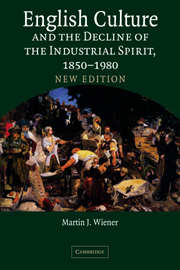Appendix: British retardation – the limits of economic explanation
Published online by Cambridge University Press: 07 May 2010
Summary
Economic explanations of British retardation begin with the classical factors of supply – capital, labor, and natural resources. Yet these by themselves explain little. Late-Victorian and Edwardian Britain boasted capital resources unprecedented in world history, resources clearly adequate to support continued rapid growth. Charles Kindle-berger concluded after a careful study of the period from 1851 to 1950 that “by any reasonable test the supply of British capital was sufficient.” To explain why domestic investment was not greater, he felt it necessary to discover why it was not more attractive. The size and competency of Britain's labor force posed no obvious obstacle to growth. There was neither a shortage of labor nor such a surplus as to discourage industrial investment. Supplies of the chief industrial resources – coal, iron, and other minerals – were more than adequate to maintain vigorous expansion. It was, as Kindleberger concluded, the use made of resources, of labor, and of capital that was crucial.
The other side of the classical economic equation – demand – offers equally insufficient illumination. Overseas demand was not slackening. Quite the contrary, the economic development of the world, broken only by the Great Depression of the nineteen-thirties, was providing ever-growing opportunities to British industry, which were on the whole not taken. The loss of the empire has been popularly seen as a fundamental cause of economic difficulties. In this view, Britain's Victorian economic preeminence had been supported by its worldwide possessions and power. “Trade follows the flag,” as the nineteenth-century slogan went. Yet students of the question over the past several decades have agreed that the empire was not, on balance, a crucial economic asset.
- Type
- Chapter
- Information
- Publisher: Cambridge University PressPrint publication year: 2004



